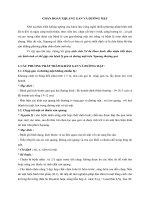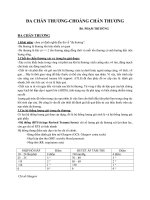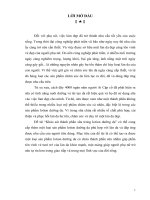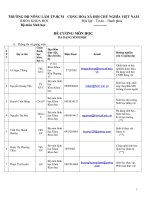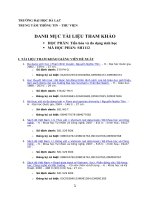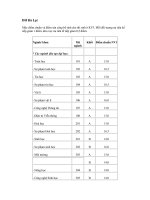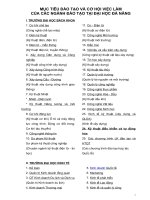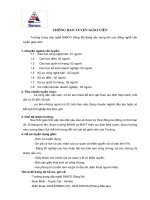Thionline3Unit10 DA
Bạn đang xem bản rút gọn của tài liệu. Xem và tải ngay bản đầy đủ của tài liệu tại đây (61.75 KB, 11 trang )
Circle the word whose underlined part is pronounced differently from that of the others
Câu 1.
A
bamboo
B
good
C
foot
D
cook
Lời giải :
Câu 1
Câu 2.
A
cake
B
panda
C
face
D
late
Lời giải :
Câu 2
Câu 3.
A
social
B
science
C
sour
D
sure
Lời giải :
Câu 3
Circle the word whose stress part is placed differently from that of the others
Câu 1.
A
reserve
B
schedule
C
wildlife
D
beauty
Lời giải :
Câu 1
Câu 2.
A
derive
B
contain
C
leopard
D
prevent
Lời giải :
Câu 2
Make the correct choice:
Câu 1. Many plants and endangered species are now endangering of _______.
A
expression
B
expulsion
C
extinction
D
extension
Lời giải :
Expression (n): sự biểu cảm Expulsion (n): sự đuổi, sự tống khứ
Extinction(n): sự tuyệt chủng Extension(n): sự mở rộng Rất nhiều những
loài thực vật và những loài động vật nguy hiểm đang trong sự nguy hiểm
tuyệt chủng
Câu 1
Câu 2. _______ is destroying larger areas of tropical rain forests.
A
Disforestation
B
Deforestation
C
Anti-forestation
D
forests
Lời giải :
Deforestation(n): sự phá rừng Sự phá rừng đang phá hủy rất nhiều vùng
rừng nhiệt đới
Câu 2
Câu 3. A lot of different conservation efforts have been made to________endangered species.
A
save
B
kills
C
make
D
do
Lời giải :
Save species: bảo vệ động vât Rất nhiều những nỗ lực bảo tồn khác nhau
được thực hiện để bảo vệ những loài động vật nguy hiểm
Câu 3
Câu 4. The raw sewage needs to be ________ treated.
A
chemically
B
chemical
C
chemist
D
chemistry
Lời giải :
Chemically(adv): về phương diện hóa học Chemical(adj): có tính hóa học
Chemist (n): nhà hóa học Chemistry(n): môn hóa học Chất thải thô cần
được xử lí theo cách hóa học
Câu 4
Câu 5. There are more than 20 ________ working on the water treatment project.
A
researches
B
researcher
C
researchers
D
research
Lời giải :
Câu 5
Research: cuôc nghiên cứu Researcher(n): nhà nghiên cứu Có hơn 20 nhà
nghiên cứu làm việc trong dự án xử lý nguồn nước
Câu 6. More and more people __________ of food poisoning nowadays.
A
exits
B
survive
C
die
D
starve
Lời giải :
Die of: chết vì nguyên nhân bên trong Ngày càng nhiều người chết vì ngộ
độc thức ăn hiện nay
Câu 6
Câu 7. The government _________ the flood victims with food, clothers and money.
A
gave
B
provided
C
offered
D
presented
Lời giải :
Provide sb with sth: cung cấp cho ai cái gì Chính phủ cung cấp cho những
người tị nạn vùng lũ thức ăn, quần áo và tiền
Câu 7
Câu 8. Many people _________ that natural resources will never be used up.
A
view
B
consider
C
believe
D
regard
Lời giải :
Câu 8
Rất nhiêu người tin rằng tài nguyên thiên nhiện sẽ không bao giờ cạn kiệt
Câu 9. Conservation is the protection of the _________ environment.
A
nature
B
natural
C
naturally
D
naturalize
Lời giải :
Nature (n): thiên nhiên Natural (adj): thuộc về tự nhiên Naturally(adv):
vốn,tự nhiên,đương nhiên Naturalize (v): tự nhiên hóa Sự bảo tồn là sự
bảo vệ của môi trường tự nhiên
Câu 9
Câu 10. There are many ________ of pollution in our modern world
A
resources
B
sources
C
foundations
D
bases
Lời giải :
Câu 10
Có rất nhiều loại ô nhiễm trong thế giới hiện đại của chúng ta
Câu 11. You ________ ask a woman about her age. It’s not polite.
A
must
B
need
C
musn’t
D
needn’t
Lời giải :
Bạn không được phép hỏi một người phụ nữ về số tuổi của cô ấy. Điều
đó rất bất lịch sự
Câu 11
Câu 12. Pay attention ________ all traffic signs when you are travelling in the street.
A
for
B
on
C
to
D
from
Lời giải :
Pay attention to sth: hướng sự chú ý đến cái gì Hãy chú ý tới những biển
báo giao thông khi bang đến đi trên phố
Câu 12
Câu 13. Their plans were cancelled _______ of a bad storm.
A
in spite
B
because
C
instead
D
in place
Lời giải :
Because of N: bởi vì cái gì Những kế hoạch của họ đã bị hủy bởi vì cơn
bão
Câu 13
Câu 14. I’ll lend you the money and you ________ pay me back till next month.
A
needn’t
B
mustn’t
C
need
D
must
Lời giải :
Needn’t +V: không cần phải làm gì Tôi sẽ cho bạn vay tiền và bạn không
cần trả lại cho đến tháng sau
Câu 14
Câu 15. You should change your wet shoes,________ you’ll catch cold
A
therefore
B
or
C
if
D
unless
Lời giải :
Câu 15
Or+ mệnh đề: nếu không…sẽ Bạn nên đổi đôi giày ướt của bạn, nếu
không bạn sẽ bị cảm
Câu 16. The twins used to play rugby when they were four year old, ________ ?
A
don’t they
B
didn’t they
C
didn’t used they
D
did they
Lời giải :
Used to: đã từng làm gì ( quá khứ)-> câu hỏi đuôi thành didn’t Cặp sinh
đôi đã từng chơi bóng bầy dục khi họ 4 tuổi đúng không
Câu 16
Câu 17. You would rather _________ talking in class so as not to make your teacher angry.
A
stops
B
stopping
C
to stop
D
stop
Lời giải :
Would rather + mệnh đề hiện tại đơn: thích,muốn làm gì Bạn muốn dừng
nói chuyện trong lớp để không làm cô giáo tức giận
Câu 17
Câu 18. I’ve got __________ money to lend you now. I think you can ask Lyn for some
A
few
B
a few
C
little
D
a little
Lời giải :
A little +N: rất ít cái gì Tôi có rất ít tiền để cho bạn vay bây giờ. Tôi nghĩ
bạn nên hỏi Lyn
Câu 18
Câu 19. To tell the truth, Aim frightened ________ ghosts.
A
for
B
on
C
with
D
of
Lời giải :
Câu 19
(be) frightended of sth: sợ gì Để nói sự thật, Aim sợ quỷ
Câu 20. Tell her that she ________ be here by six. I insist on it.
A
may
B
must
C
ought to
D
might
Lời giải :
Must be: phải Nói với cô ấy rằng cô ấy phải ở đây đến 6h. Tôi chắc chắn
thế
Câu 20
Câu 21. There’s _______ university in my neighborhood.
A
an
B
a
C
the
D
Φ
Lời giải :
Danh từ chưa được xác định,nhắc đến lần đầu trong câu ,dùng a/an Có
một trường đại học ở vùng lân cận
Câu 21
Câu 22. He hurried _________ he wouldn’t be late for class.
A
since
B
as if
C
unless
D
so that
Lời giải :
Câu 22
So that + mệnh đề: với mục đích gì Anh ấy vội để không muốn muộn học
Câu 23. There should be no discrimination _______ grounds of sex race or religion
A
on
B
at
C
of
D
in
Lời giải :
On grounds of sth: với lý do Không nên có những sự kì thị với lý do về
giới tính và vùng miền
Câu 23
Câu 24. He has refused, but he _________ change his mind if you asked him again
A
might
B
may
C
can
D
must
Lời giải :
Cấu trúc điều kiện loại 2: If + mệnh đề quá khứ, S+ might/could/would V
Anh ấy đã từ chối,nhưng anh ấy đã có thể thay đổi suy nghĩ nếu bạn hỏi
lại anh ấy
Câu 24
Câu 25. Two parallel white lines in the millde road meant that you _________ not overtake.
A
must
B
might
C
may
D
need
Lời giải :
Must not V: không được phép làm gì Hai vạch kể trắng ở giữa đường có
nghĩa là bạn không được phép vượt
Câu 25
Choose the underlined words that need correcting.
Câu 1. The bus will be leaving on five minutes so you’d better hurry up.
A
A
B
B
C
C
D
D
Lời giải :
Câu 1
sửa "on"->"in"
Câu 2. Many teachers have devoted their lives to teaching, therefore teaching is not a well-paid job.
A
many
B
their
C
to
D
therefore
Lời giải :
Câu 2
therefore-> so
Câu 3. My parents often take careful of me when I am ill.
A
A
B
B
C
C
D
D
Lời giải :
Câu 3
take care of sb: chăm sóc ai
Câu 4. She passed the board exam, who made her parents proud.
A
A
B
B
C
C
D
D
Lời giải :
mệnh đề quan hệ thay thế cho cả mệnh đề, dùng which đằng sau dấu
phẩy
Câu 4
Câu 5. Lack of properly physical exercise cause tiredness and poor health.
A
A
B
B
C
C
D
D
Lời giải :
Câu 5
cause-> causes
Read the passage and choose the best answers.
World Wildlife Fund (WWF) safeguards hundreds of species around the world, but we focus species attention on our flagship
species: giant pandas, tigers, endangered whales and dolphins, rhinos, elephant, marine turtles and great apes. These species not
only need species measures and extra protection in order to survive, they also serve as “umbrella” species: helping them helps
numerous other species that live in the same habitats. In addition to our flagship animals, we work to protect numerous species in
peril around the world that live within our priority eco-rigions. Laree predators like snow leopards and grizzly bears, migratory
species like whooping cranes and songbrids, and a host of other species facing threats also benefit from WWF’ s conservation
efforts. Our wildlife trade experts at “traffic” work to ensure that trade wildlife products, doesn’t harm a species, while also
fighting against illegal and unsustainable trade. WWF is known for acting sound science. Science leads and guides us strategies
and approaches, from the way to restore tigers in viable, breed population to decide which areas need protection the most.
Câu 1. What does WWF stand for?
A
World Wildlife Food
B
World Wildlife Formation.
C
World Wildlife Fund.
D
World Website Fund
Lời giải :
Câu 1
Line 1 (đoạn 1) World Wildlife Fund (WWF)
Câu 2. How many species do we pay much attention to?
A
5
B
8
C
7
D
9
Lời giải :
Câu 2
we focus species attention on our flagship species: giant pandas, tigers,
endangered whales and dolphins, rhinos, elephant, marine turtles and
great apes
Câu 3. What is the meaning of the world habitats in pharagraph 1?
A
The place where animals or plants are normally
found.
B
The place where animals or plants can drink and
sleep.
C
The place where animals or plants can eat find their
enemy.
D
The place where animals can find and keep their
body warm.
Lời giải :
Câu 3
Câu 4. What can science help us in safeguarding endangered species?
A
Find the way to kill all species easily
B
Lead and guide strategies and approaches
C
Discover another habitat of animal
D
Search for a food source for animals
Lời giải :
Câu 4
Science leads and guides us strategies and approaches
Câu 5. Which of the following is not stated in the passage?
A
WWF safeguards hundreds of species around the
world.
B
WWF is known for acting on sound science.
C
these above species need extra protection so as not
to be extinct.
D
All species are so fierce that scientists can’t take
care of them.
Lời giải :
Câu 5
Read and choose the appropriate option:
WHY DO ANIMALS GO EXTINCT? Different kinds of animals have appeared and disappeared throughout Earth’s history.
Some animals go extinct because the climate (41)_______ they live changes. The climate may become wetter or drier. It may
become warmer or cooler. If the animals cannot change, or adapt, to the new climate, they die. Some animals go extinct because
thay cannot (42) _______ with other animals for food. Some animals go extinct because they are killed by enemies. New kinds
of animals are always evolving. Evolving means that the animals are changing (43) _______ from generation to generation. Small
differences between parents, children, and grandchildren slowly add up over many, many generations. Eventually, a different kind
of animal evolves. [evolve: tiến hóa] Sometimes many of the animals on Earth go extinct at the (44) _______ time. Scientists call
this a mass extinction. Scientists think there (45) _______ at least five mass extinctions in Earth’s history. The last mass
extinction happened about 65 million years ago. This mass extinction killed off the dinosaurs.
Câu 1.
A
where
B
which
C
when
D
what
Lời giải :
where (the climate where they live: ở vùng khí hậu nơi chúng sinh sống)
Câu 1
Câu 2.
A
complete
B
find
C
compete
D
exist
Lời giải :
Câu 2
Câu 3.
Compete with sb/st: đấu tranh với cái gì,với ai
A
accidentally
B
suddenly
C
quickly
D
slowly
Lời giải :
Accidentally(adv): một cách tình cờ Suddenly (adv): một cách đột ngột
Quickly(adv): một cách nhanh chóng Slowly(adv): một cách chậm,từ từ
Câu 3
Câu 4.
A
same
B
similar
C
different
D
various
Lời giải :
At the same time: cùng lúc với nhau
Câu 4
Câu 5.
A
has been
B
have been
C
will be
D
are
Lời giải :
Câu 5
five mass extinctions: số nhiều -> there have been
Choose the sentence which is closest in meaning to the original one.
Câu 1. The gate was closed to stop the children running into the road.
A
The gate was closed so the children running into the
road.
B
The gate is closed so that children don’t run into the
road.
C
The gate was closed so that the children couldn’t
run into the road.
D
The gate is closed that the children couldn’t to run
into the road.
Lời giải :
Câu 1
Cấu trúc so that: chỉ mục đích Cái cổng đã bị đóng lại để cho lũ trẻ không
thế ra ngoài đường
Câu 2. My Indian friend finds using chopsticks difficult.
A
My Indian friend is not used to using chopsticks.
B
My Indian friend can’t use chopsticks.
C
My Indian friend didn’t use to using chopsticks.
D
My Indian friend don't use to using chopsticks.
Lời giải :
Câu 2
(be)used to ving: quen với việc làm việc gì ở hiện tại
Câu 3. Too tired to continue, David stopped walking.
A
David couldn’t carry on walking because he was
too tired.
B
David couldn’t stop walking because he was to
tired.
C
David was too tired to carry out walking.
D
David can’t continue to walk when he’ stirred.
Lời giải :
Câu 3
Quá mệt để tiếp tục, David dừng đi bộ => David không thể tiếp tục đi bộ
vì anh ấy đã quá mệt
Câu 4. I haven’t met old English teacher since I left school.
A
I didn’t have a chance to meet my old English
teacher because I left school.
B
this is the last time I met my old English teacher at
shool.
C
My old English teacher hasn’t met me since I have
left school
D
I last met my old English teacher when I left school.
Lời giải :
Câu 4
Tôi đã không gặp cô giáo dạy Tiếng Anh cũ của tôi từ khi tôi rời trường
Câu 5. Tom didn’t begin to read until he was eight.
A
It was not until Tom was eight that he began to
read.
B
When Tom was eight, he didn’t know how to read.
C
Tom had read when he was Wight to read.
D
Not until Tom read, he was eight
Lời giải :
Câu 5
Tom đã không bắt đầu đọc sách cho tới tận khi anh ấy 8 tuổi
